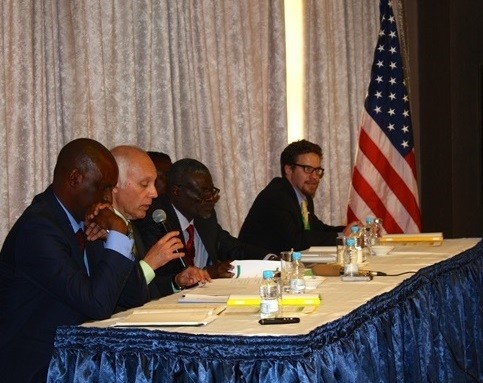
Lusaka, Zambia -- Good morning. It is my great pleasure to be here today on behalf of the United States Agency for International Development! I bring you greetings from the U.S. Ambassador to Zambia, Mr. Eric Schultz, and thank the Honorable Given Lubinda, Minister of Agriculture and Livestock, for opening this important two-day event. And I am delighted to note that the important innovations developed over the last four years through this program are the result of cooperative efforts between international and Zambian scientists, working together, in Zambia, to help the Zambian people.
I am honored to join today many in national and local government, other cooperating partners, and international agricultural centers to share these promising innovations. To the farmers in the field, the men and women who are the engines of economic growth, who seek constantly to better their family’s futures, we welcome you and thank you for your support for this important field-based research and analysis. The Feed the Future R&D Project has worked at every level to encourage local solutions to Zambia’s needs, and an indispensable partner has been many small farming communities in Eastern Province. The achievements we celebrate today would not have been possible without years of hard work by many.
The U.S. Government launched Feed the Future in 2010 to help transform lives around the world. Working hand-in-hand with other USG agencies and donors, USAID helped build a partnership with 19 countries, including Zambia, to break the cycle of extreme poverty and increase food security. Feed the Future has helped pioneer a new model of development, seeking to invest in game-changing innovations to improve peoples’ lives. It leverages innovation, such as innovative use of conventional plant breeding techniques, to strengthen agriculture and health. And the Zambia Agriculture Research and Development, or R&D Project, is an excellent example of how effective this can be.
Operating in Eastern Province, the R&D project has helped strengthen the capacity of Zambia’s national agricultural research institute to raise farm productivity through adoption of low-cost and improved technologies, including high-nutrient crops, by smallholder famers. Over the past four years the United States has invested more than $15 million to support this effort, through development, field-testing, adaptation and dissemination of new locally-appropriate technologies that contribute to household and national food and nutrition security.
These objectives were pursued through six different R&D activities, implemented by five of the world’s leading agricultural research centers: CIP, ICRISAT, CIMMYT, IITA, and the International Center for Tropical Agriculture/Harvest Plus, all working in close collaboration with the Zambia Agriculture Research Institute, or ZARI. Other key partners included the University of Zambia School of Agriculture Sciences, the National Institute for Scientific and Industrial Research, the Agriculture Research Service of the United States Department of Agriculture, and the University of Arizona.
The combined efforts of such a powerful team have identified more than 25 new technologies that have been proven to significantly increase the productivity of key value chains such as maize, groundnuts, soybeans, orange-fleshed sweet potato, orange maize, cassava and cowpeas. And increased productivity can allow for greater crop diversity for smallholder farmers.
In addition, by supporting agricultural laboratories in Chipata and Mt. Makulu, and with accelerated training for local scientists and technicians, the Ministry of Agriculture can now better assess the presence of toxins in food products and produce more disease-free planting materials. The program has also supported improved aflatoxin mitigation and new groundnut varieties that have allowed farmers to enter new and previously untapped markets. And better groundnut yields have especially empowered women farmers, as they are the ones who typically grow groundnuts.
The Feed the Future R&D Project links its many partners to ZARI and the Department of Agriculture extension services to provide vital information and improved technologies to area farmers, including through the Ministry’s revision of crop production guidelines being used by extension workers, NGOs, and private sector stakeholders.
And the potential is truly great! For example, in the 2013-14 growing season, farmers who participated in this R&D project and tested high yielding, disease resistant groundnuts experienced 30 percent higher yields than other groundnut farmers. Maize yields rose 23% compared to the previous year, with improved local hybrids and agronomic practices. With promotion of the nutritional benefits of orange-fleshed sweet potatoes and an increase in the number of vine multipliers, sweet potato yields were up 15 percent and, overall, sweet potato sales rose 41 percent over the previous season.
These impressive results can be attributed to a combination of the R&D project, Feed the Future activities, local farmers and – importantly - private sector players in Eastern Province, with the recent flagging off of orange maize seed an excellent example. Orange maize was produced and consumed by close to 100,000 households, an increase of more than 300% from the previous year, and this is helping to improve the nutrition of thousands of Zambian households.
As President Obama said during his recent trip to Kenya, Feed the Future "is a model that's working" and, boosted with private sector investment, is "further advancing the development of a more productive agricultural sector across the African continent.”
I sincerely thank the Honorable Minister Lubinda, the Zambian Government, our many local partners, and the Zambian farmers, women and men, for leading the way. USAID is honored to be part of this process that is helping to shape the future of Zambia and Africa. We hope that the innovations developed under this project spread like sunshine and gentle rains throughout Zambia, helping to lift communities to prosperity. Innovative agricultural research and development will clearly have a decisive role to play in this transformation, today and well into the future, building local solutions for the Zambian people.
Thank you.







Comment
Make a general inquiry or suggest an improvement.